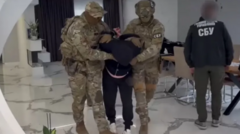As the Russia-Ukraine war escalates, both nations assert divergent narratives over control of the Kursk region, with implications for international peace talks.
# Tensions Rise as Russia and Ukraine Clash Over Kursk Region Control

# Tensions Rise as Russia and Ukraine Clash Over Kursk Region Control
Claims of Territory Retaken Fuel Ongoing Conflict and Diplomatic Negotiations
In a significant development in the ongoing Russia-Ukraine conflict, Russian military leaders announced the recapture of Gornal, the final village reportedly under Ukrainian control in the Kursk region. This claim, articulated by General Valery V. Gerasimov, head of Russia's military operations, was broadcast during a video conference with President Vladimir V. Putin on Saturday. Gerasimov proclaimed that this strategic gain had "completed the defeat of the Ukrainian armed forces that attacked the Kursk region," signifying a potential shift in the territorial dynamics of the war.
However, Ukrainian officials quickly countered this assertion, insisting that their forces remain active in the area and that military operations continue. The Ukrainian General Staff issued a statement declaring, "The operational situation is difficult, but our units continue to hold their positions," indicating that the Ukrainian military is resolute despite the challenges.
The struggle for the Kursk region has complex implications beyond battlefield control, as the area's status could significantly influence ongoing peace negotiations, particularly those initiated recently involving U.S. President Trump’s special envoy. On Friday, envoy Steve Witkoff engaged in lengthy discussions with Putin, underscoring the urgency to broker a resolution to the protracted conflict.
As each side maintains its position during this critical juncture, the international community watches closely, hoping for a peaceful resolution amidst the escalating tensions in this bitter war.





















